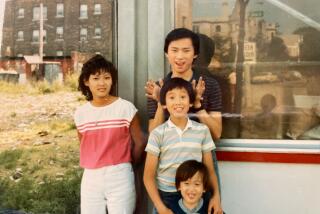When East Meets West Within the Same Person : Lifestyle: After realizing that one can say ‘thank you’ too often, it’s now second nature for a journalist of East Asian ancestry to turn the cultural switches on and off.
Like millions of Americans of East Asian ancestry, I feel blessed to have both Confucian and Judeo-Christian heritages to call my own.
The two coexist within me because of my dual identity as an Asian American. The teachings of the Chinese philosopher are part of my cultural DNA; they affect the way I think, work and conduct my private and public lives. But so do Judeo-Christian principles, because they provide the foundation of the American ethos which, too, has become part of me.
After more than four decades of living in both worlds, it’s second nature to turn my cultural switches on and off. I bow when I meet visitors or immigrants from Korea, my birthplace, or Japan, where I spent my formative years. And I use an honorific if they happen to be my age or older. But if they’re younger, I’ll make sure to pick the appropriate level of speech, befitting their age and social position.
With my ever-present cultural antennae, I note how Confucianism, which so profoundly influenced East Asian approaches to love, family, education, humility, civility, and honesty, often conflicts with American ways.
The most glaring example is the American emphasis on verbalizing everything. In this culture, an ability to articulate is admired. In Confucian-influenced cultures, however, silence is a virtue. Talking is not.
Belatedly, after varied mishaps, I’ve also learned that in American culture, “yes” means “yes” and “no” means “no,” but in East Asian cultures, a “yes” can be “yes,” “maybe,” “I’m listening,” or even “no.”
“We try to avoid having to say ‘no’--preferring indirect communication--because it creates ill feelings,” Nobuaki Hanaoka, a Japan-born theologian in Berkeley, told me. “We prize harmony in our culture above everything.”
Going to school in the Midwest in the ‘60s, soon after my arrival in America, I remember classmates making fun of Confucius by pulling up their eyes and quoting something silly from a Chinese fortune cookie with: “Confucius says. . . . “
That they were making fun of the great teacher, venerated by Asians for 2,500 years, didn’t offend me. But their actions showed me that the cultural gap may be unconquerable.
Kung Fu-tzu, who was born 551 years before Christ, became Confucius in the West because Jesuit missionaries maimed his name.
The sage’s system of ethics and rules for proper behavior is played out in America every day in countless interactions between people of Asian heritage and the rest of the population. The Asian tendency to be reserved, sometimes mistaken for aloofness here, is a case in point.
Confucianism thrived in Korea even more so than in the country of its birth. Koreans embraced Confucianism with such fervor that it became a state religion for six centuries, until 1910. Even today, Koreans remain die-hard Confucians, manifesting extremes of Confucianism with their preoccupation with hierarchy, age and ancestor worship.
For Asian American immigrants straddling different worlds, acculturation is a two-way street.
This I learned in the autumn of 1967, when I went to my ancestral land as a young newspaperwoman in search of my roots.
Having lived most of my life in the United States and Japan, where “thank you” is said often, it was my habit to use those words in response to a kind deed.
I was happily working on a Korean newspaper in Seoul on one November day when I got the cultural shock of my life.
“Miss Kang, you say ‘thank you’ too much,” said Myong-sik Kim, a reporter who sat across from me, disapproval stamped on his face.
“What did you say?” I asked, to make sure I had heard him right.
“You say ‘thank you’ too often.”
He explained that with a perfunctory “thank you” I was dismissing an act of kindness much too lightly. It would be better to say thank you less often, and instead think of a way to reciprocate at a later time, he said.
Confucius didn’t tell Koreans not to thank people, but they seem to have carried his emphasis on maintaining decorum to the point where even salutations have to be properly restrained.
Koreans also have an aversion to using names. Instead, they call each other by titles. There are so many “presidents” among Korean immigrants in Los Angeles that one wonders if there are any employees left. Every Korean with a business is referred to as “president”--even if it’s a hole-in-the-wall bakery in Koreatown.
Similarly, the Korean etiquette is to say: Teacher Yi, Lawyer Min and so on. Even a convicted felon gets a title: Convict Chun.
I get around this by addressing most Koreans I see as sunsaeng-nim , a polite catch-all word meaning teacher.
Other differences separating East Asians from the Eurocentric American culture include the attitude toward humanity’s place in the universe.
East Asians view society as a collection of families, whereas people of European roots operate from the 18th-Century idea of society as an assortment of individuals--all pursuing their own interests.
The disparity manifests itself even in such routine things as names. East Asians use the family name first, followed by personal names--a recognition of the superiority of the family over the individual.
King-Kok Cheung, an English professor at UCLA who is Chinese American, says she would like to see aspects of Asian culture, such as an appreciation for nonverbal communication, go mainstream.
Instead of stressing that Asians become more “vocal,” and spell out what they mean, Cheung suggests that non-Asians could benefit by cherishing nuances of silence and avoiding confrontation.
Maybe that will happen in the 21st century, being billed as the “Pacific Century.” For now, I try to remember what Confucius said: “By nature, all men are so alike. It’s by their habits they become so different.”


